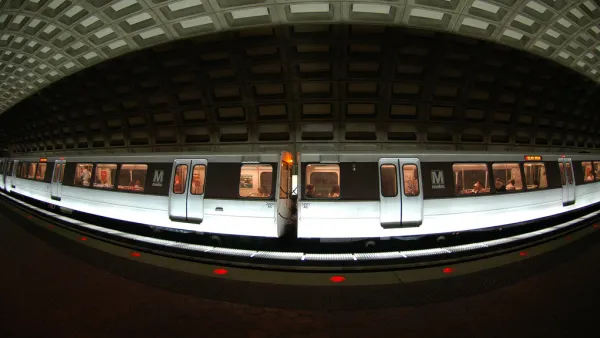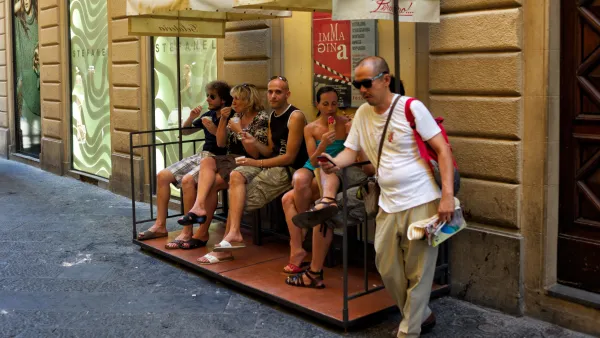Land Use
Mayoral Candidate Portrays Plans for Pittsburgh's Grand Boulevard
Bill Peduto isn't waiting for his presumptive election as Pittsburgh's mayor next month to detail his vision for creating a more livable city. He's calling for an 11-block stretch of Smithfield Street in Downtown to become a grand boulevard.
NYC Releases New Street Design Manual
New York City's Department of Transportation has officially released the second update to its Street Design Manual, providing specifics on new and forthcoming alterations to the city's streets and street furniture.
Leading Urbanists Adopt Charter Calling for a New Canadian Urban Model
After 5 years of debate, and much handwringing over the use of the word "sprawl", the Council for Canadian Urbanism (CanU) adopted a Charter for Canadian Urbanism at its 5th annual summit in Halifax.
Garcetti Proposes "Chief Resilience Officer" to Tackle L.A.'s Earthquake Preparedness
Recent controversies have called into question whether Los Angeles officials have done all they can to prepare the city for its next big earthquake. Mayor Eric Garcetti is making earthquake preparedness a top priority.

A Design and Planning To-Do List for NYC's Next Mayor
Over the past 12 years, New York has been transformed. For the better in some instances (bike lanes, pedestrian plazas), and perhaps not in others (unaffordability). Michael Kimmelman suggests how to build on the successes and correct the problems.
The Gold Standard for Civic Data Delivery
Emily Badger is extremely impressed—and for good reason—with the City of Los Angeles' new neighborhood data portal, built in connection with the development a new health and wellness chapter for the city's General Plan.
Americans Pay More for Walkability
Preliminary results from a new study suggest that Americans are willing to pay about $850 more per Walk Score point when purchasing a home.
Rebuffing Planner Recommendations, Illinois Officials Approve New Expressway
The approval of the Illiana Expressway by the CMAP Policy Committee rejects the recommendation of the organization's own planners and years of regional cooperation. Yonah Freemark says the decision will have an effect on regional planning nationwide.
A Sociologist Explains Why We Shouldn't Dismiss the Cul-de-Sac
With their anti-urban inward orientation, cul-de-sacs are representative of the auto-oriented, privatized suburban development model. But one sociologist is out to demonstrate their benefits by showing how cul-de-sacs can develop social cohesion.
Developer Detente Will Grow NYC's Billionaires' Row
After seven years of stalemate, two developers have reached an agreement that will allow them to build ultraluxury towers on the northern edge of Midtown. The area is becoming the modern equivalent to what the robber barons built a century ago.
Another Story of a City: Biodiversity
The short-sightedness of overarching proclamations for the right city form obscures the very context in which cities are built and expanded. City planning must become reconnected to its environmental context.
L.A.'s New Mayor Halts Planning Department Merger
A controversial plan to merge L.A.'s Planning and Building and Safety Departments has been scuttled, for now. Mayor Eric Garcetti, who supported the merger as a councilman, announced it will not go forward in January as his predecessor had planned.
Effort to Rein in Federal Flood Insurance Program Causing Alarm
As a 2012 law aimed reforming the "increasingly unsustainable" National Flood Insurance Program goes into effect, some homeowners in coastal areas are seeing dramatic increases in their insurance rates. Lawmakers are pondering how to ease the pain.
City Initiative Embraces Bottom-Up Placemaking in L.A.
The same week that the City of L.A. made a big splash with its "Great Streets Initiative", a new program that has the potential to have a sizable impact on city streets went less noticed. Damien Newton reports on the city's "People St" program.

Why Suburban Sprawl is the Worst Idea America Has Ever Had
In a recent "TED Talk", Jeff Speck makes the case for creating a more walkable America based not on design arguments, but rather on the potential to create a more economically resilient, healthier, and environmentally sustainable country.
Will Move to Encourage Density Stifle Downtown L.A. Redevelopment?
Out of concern that L.A.'s downtown properties are not being put to the highest and best use, the City Councilman representing the district has "quietly authored" a motion to incentivize density and place a moratorium on low-rise development.

Too Much TOD Set to Strain D.C.'s Subway
New development is poised to add thousands of riders to D.C.'s Metro, but rush hour trains are often packed already. Though Metro has proposed $6 billion in fixes, some see better land use planning across the area as the key to solving the problem.
Top 100 City Innovators Worldwide
To celebrate its first anniversary, Future Cities has assembled a list of the top 100 city innovators making the biggest difference across a range of industries and specialties.
Seeking an Automotive Balance in Philly
The city continues to grapple with the practical implications of local planning legend Edmund Bacon's prescriptions for carless streets.

The Next Big Thing: "Sit-able Cities"
Supported by imagery of human urban conduct, Chuck Wolfe argues that walkable is good, but sit-able is better—and that "it’s time for the next big focal point and the next big idea, the 'Sit-able City'."
Pagination
Urban Design for Planners 1: Software Tools
This six-course series explores essential urban design concepts using open source software and equips planners with the tools they need to participate fully in the urban design process.
Planning for Universal Design
Learn the tools for implementing Universal Design in planning regulations.
EMC Planning Group, Inc.
Planetizen
Planetizen
Mpact (formerly Rail~Volution)
Great Falls Development Authority, Inc.
HUDs Office of Policy Development and Research
NYU Wagner Graduate School of Public Service


































